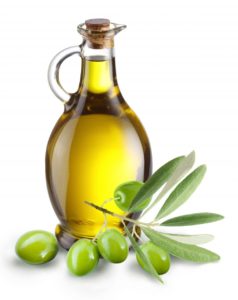 Lately more and more research has been finding health benefits with frequent consumption of extra virgin olive oil (EVOO). It is also a basic part of the popular Mediterranean diet - which emphasizes fresh fruits and vegetables, nuts, legumes (beans), whole grains, some fish, and extra virgin olive oil. Now a study conducted by investigators at Temple University in Philadelphia, Pennsylvania, suggests that the olive oil in the Mediterranean diet probably promotes healthy brain aging. The researchers said: "Our study is the first demonstration that EVOO can beneficially affect memory, amyloid plaques, and tau pathology, the hallmark lesions in the brain of Alzheimer's patients."
Lately more and more research has been finding health benefits with frequent consumption of extra virgin olive oil (EVOO). It is also a basic part of the popular Mediterranean diet - which emphasizes fresh fruits and vegetables, nuts, legumes (beans), whole grains, some fish, and extra virgin olive oil. Now a study conducted by investigators at Temple University in Philadelphia, Pennsylvania, suggests that the olive oil in the Mediterranean diet probably promotes healthy brain aging. The researchers said: "Our study is the first demonstration that EVOO can beneficially affect memory, amyloid plaques, and tau pathology, the hallmark lesions in the brain of Alzheimer's patients."
But... note that they are taking findings from their study done on mice and hypothesizing that this is what is also going on in humans. Their study used specially bred mice (and only 22 in total) - one group which received extra virgin olive oil in their food (starting at 6 months of age), and the other not. The researchers found that after a few months of this diet that there were differences between the 2 groups when tested at 12 months (which is also when they were euthanized). Note that mice are short lived and after 6 months they are considered "mature adults".
The researchgers now plan to test varying daily doses of EVOO on humans soon - this way they can see what the minimal dosage is for beneficial effects (if any), and if there is a maximal dosage where there are negative health effects. In the meantime, enjoy olive oil in your diet - looks like it will benefit your health in a number of ways (here, here, and here). From Medscape:
Olive Oil Key Ingredient in Alzheimer's Prevention?
Extra-virgin olive oil (EVOO) appears to protect memory and learning ability and reduces the formation of beta amyloid (Aβ) plaques and neurofibrillary tangles in the brain — the classic hallmarks of Alzheimer's disease (AD) — new animal research shows. The study, conducted by investigators at Temple University in Philadelphia, Pennsylvania, suggests that it is the olive oil component of the Mediterranean diet that likely promotes healthy brain aging.... "And results are important enough to absolutely encourage people to consume greater amounts of EVOO. Given that it's been consumed for at least 2000 years, I do not anticipate any side effects," he added.
For the study, the investigators tested the potentially beneficial effects of EVOO on triple transgenic mice. These mice are specifically bred to develop key pathologic features of AD (Alzheimer's disese), including amyloid plaques and neurofibrillary tangles. The animals were divided into two groups. One group received EVOO-enriched chow, and the other received regular chow without EVOO. The olive oil was introduced into the diet when the mice were 6 months of age, before they began to develop symptoms of AD..... The mice were subjected to the same behavioral tests at both 9 and 12 months of age, after which they were euthanized and their brains were examined for the presence of key pathologic features of AD.
The researchers confirmed that mice fed the EVOO-enriched diet performed significantly better at both 9 and 12 months on tests designed to assess working memory, spatial memory, and learning abilities compared with mice fed regular chow. The researchers also found a statistically significant reduction in the amount of Aβ peptides deposited in the brains of the EVOO-treated animals compared with controls. There was also a significant reduction in the phosphorylated forms of tau in mice fed the EVOO-enriched chow compared to controls, although olive oil had no effect on total tau levels in the same region of the brain.
The investigators also examined whether the improvements in cognitive performance and brain pathology that were observed in EVOO-treated mice might be the result of an improvement in synaptic integrity. Once again, they found greater preservation in the integrity of the synapses between neurons in EVOO-fed mice compared with controls.... Furthermore, there was a dramatic increase in nerve cell autophagy activation in brain cells from the EVOO-fed animals compared with controls. Dr Pratico explained that autophagy is a mechanism by which cells digest proteins that are produced in excess or that are abnormal. In this particular animal model, autophagy digests and gets rid of both amyloid plaques and phosphorylated tau.
"Thanks to the autophagy activation, memory and synaptic integrity were preserved, and the pathological effects in animals otherwise destined to develop Alzheimer's disease were significantly reduced. This is a very important discovery, since we suspect that a reduction in autophagy marks the beginning of Alzheimer's disease."
